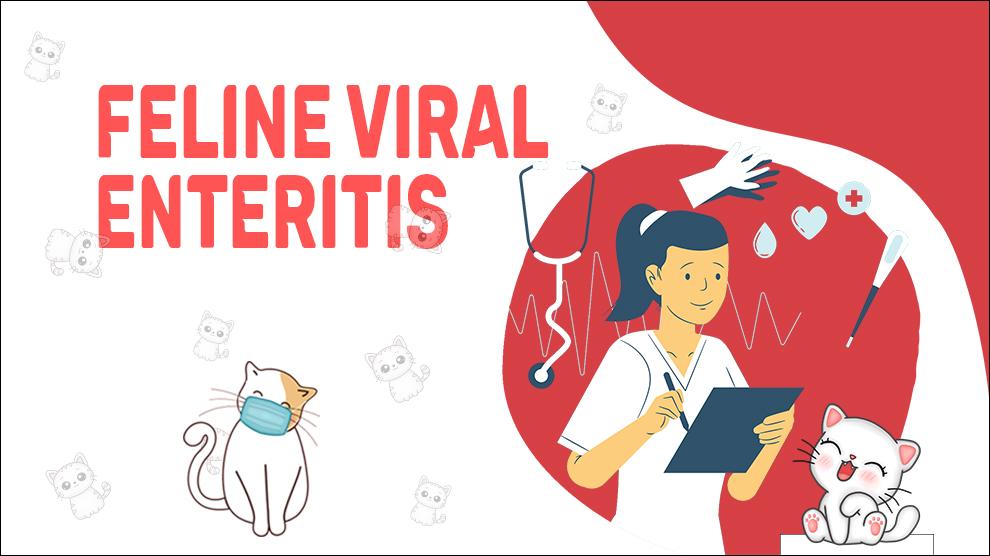What Is Feline Enteritis?
Feline Viral Enteritis, also known as Feline Panleukopenia, is a highly contagious viral disease that affects cats of all ages but is most common in kittens.
It is caused by the feline parvovirus, which attacks the rapidly dividing cells in the body, leading to a decrease in white blood cells and damage to the gastrointestinal tract.
The virus is highly resilient and can survive for extended periods in the environment, making it easy to spread.
Clinical Signs Of Feline Enteritis
The symptoms of Feline Viral Enteritis can vary from mild to severe and can include:
- Vomiting
- Diarrhea (sometimes with blood)
- Lethargy
- Anorexia (loss of appetite)
- Fever
- Dehydration
- Weight loss
- Depression
- Abdominal pain
- Weakness
- Seizures (in severe cases)
- Blood In Vomit
- Bloody Diarrhea
- Not Eating
- Loss Of Skin Elasticity
- Sunken Eyes
- Pale Gums
- Hiding
- Depression
- Lack Of Coordination
Treatment Options For Feline Enteritis
There is no cure for Feline Viral Enteritis, and treatment involves supportive care to manage the symptoms and prevent complications. The primary goal is to keep the cat hydrated and provide nutritional support.
Treatment may include:
- Fluid therapy: Administer fluids either subcutaneously or intravenously to keep the cat hydrated.
- Medications: To manage vomiting and diarrhea and prevent further dehydration.
- Antibiotics: To treat secondary bacterial infections.
- Nutritional support: Providing a bland, easily digestible diet to aid in recovery.
Home Remedies For Feline Enteritis
While it is important to seek veterinary care for a cat with feline viral enteritis, there are a few home remedies that can help manage symptoms and aid in recovery:
- Hydration: Encourage your cat to drink water to prevent dehydration. Offer fresh water frequently and consider adding a small amount of low-sodium chicken broth to make it more enticing.
- Nutritious food: Provide your cat with high-quality, easy-to-digest food that is rich in nutrients. Offer small, frequent meals throughout the day to encourage eating. Avoid giving your cat dairy products and human food.
- Rest: Allow your cat to rest in a quiet, comfortable space to help conserve energy and aid in recovery.
How To Prevent Feline Enteritis?
The best way to prevent Feline Viral Enteritis is to vaccinate cats, especially kittens, and maintain a clean environment.
Vaccination is the most effective way to protect cats from the virus. Kittens should receive a series of vaccinations starting at 6-8 weeks of age, with boosters every 3-4 weeks until they are 16 weeks old.
Adult cats should receive yearly vaccinations. Keeping the environment clean by regularly cleaning litter boxes, food dishes, and bedding, can also help prevent the spread of the virus.
Affected Cat Breeds Of Feline Enteritis
All cats are susceptible to Feline Viral Enteritis, but kittens and cats with compromised immune systems are at a higher risk.
Causes For Feline Enteritis
Causes:
Feline Viral Enteritis is caused by the feline parvovirus, a highly contagious virus that can survive for extended periods in the environment.
Cats become infected by coming into contact with the virus through contaminated objects, such as food dishes, litter boxes, and bedding, or by coming into contact with an infected cat's bodily fluids.
When To See A Vet For Feline Enteritis?
If you suspect that your cat has Feline Viral Enteritis, it is important to seek veterinary care immediately. The earlier the diagnosis and treatment, the better the chances of recovery.
Dehydration and electrolyte imbalances can occur quickly, so early intervention is critical. Contact your veterinarian if your cat shows any of the symptoms mentioned above.
Food Suggestions For Feline Enteritis
During recovery, it is important to provide your cat with high-quality, easy-to-digest food that is rich in nutrients.
Here are some food suggestions:
- Commercial cat food: Look for cat food that is specifically formulated for cats with digestive issues. Choose a high-quality brand that lists a named protein source as the first ingredient and does not contain any artificial preservatives or colors.
- Homemade food: You can prepare a homemade diet for your cat using ingredients such as boiled chicken or turkey, white rice, and low-sodium chicken broth. Consult with your veterinarian to ensure the diet meets your cat's nutritional needs.
Conclusion
Feline viral enteritis, also known as feline panleukopenia, is a highly contagious viral disease that can be deadly if left untreated. Symptoms include vomiting, diarrhea, lethargy, and loss of appetite.
The disease is caused by the feline parvovirus and can be prevented through vaccination. If you suspect your cat has feline viral enteritis, it is important to seek veterinary care immediately.
Treatment may include hospitalization, supportive care, and medication to manage symptoms. While recovery can be difficult, providing your cat with a nutritious diet, hydration, and a comfortable space to rest can aid in the healing process.











